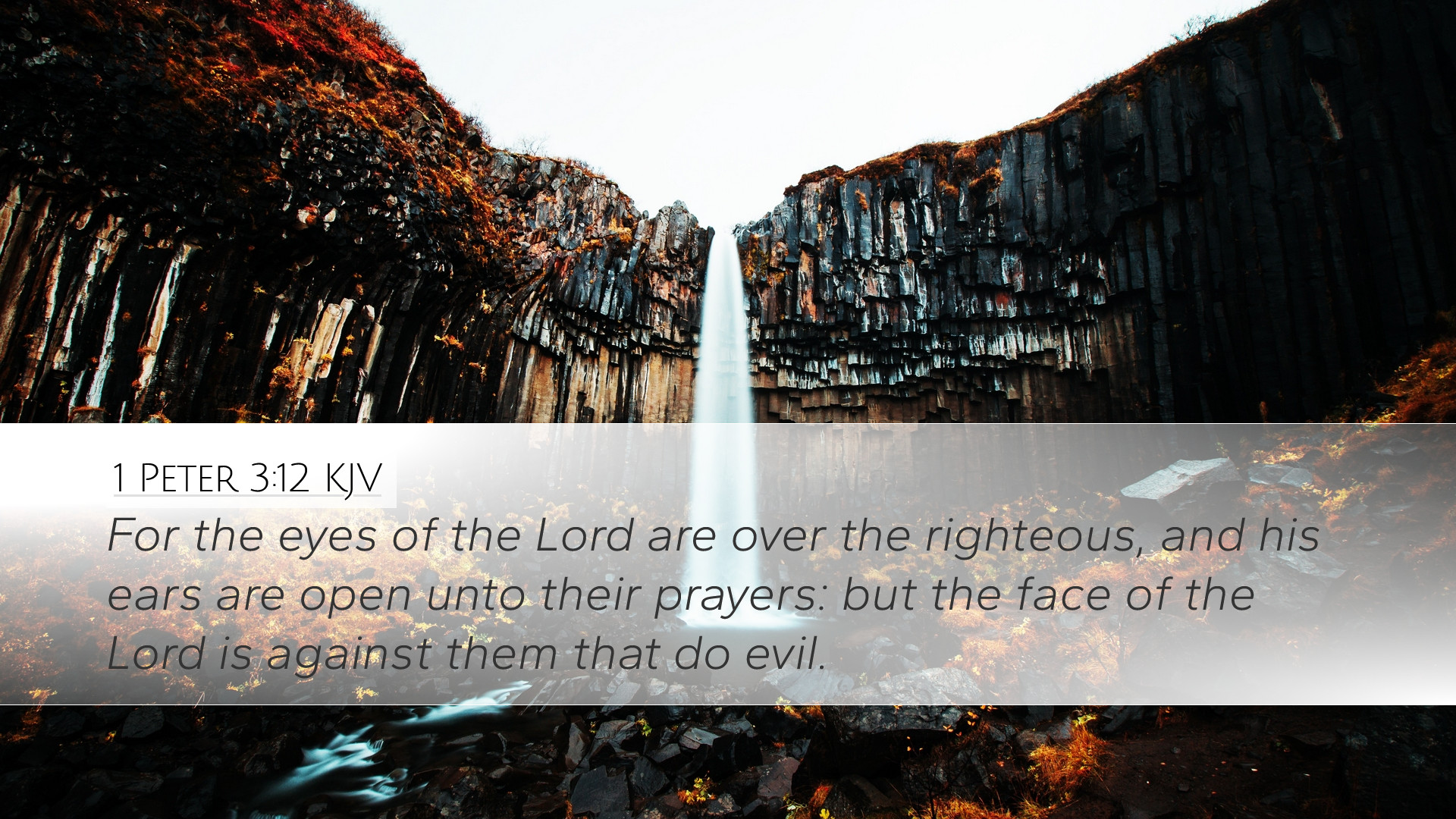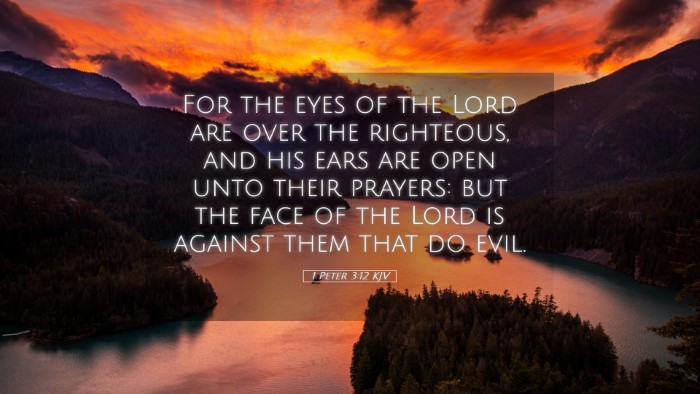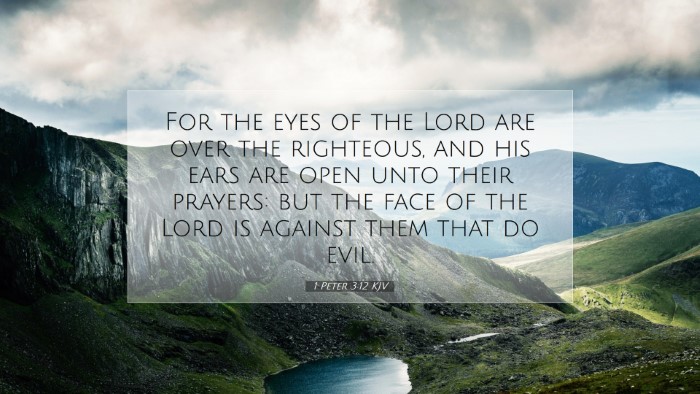Old Testament
Genesis Exodus Leviticus Numbers Deuteronomy Joshua Judges Ruth 1 Samuel 2 Samuel 1 Kings 2 Kings 1 Chronicles 2 Chronicles Ezra Nehemiah Esther Job Psalms Proverbs Ecclesiastes Song of Solomon Isaiah Jeremiah Lamentations Ezekiel Daniel Hosea Joel Amos Obadiah Jonah Micah Nahum Habakkuk Zephaniah Haggai Zechariah Malachi1 Peter 3:12
1 Peter 3:12 KJV
For the eyes of the Lord are over the righteous, and his ears are open unto their prayers: but the face of the Lord is against them that do evil.
1 Peter 3:12 Bible Commentary
Commentary on 1 Peter 3:12
Bible Verse: 1 Peter 3:12 - "For the eyes of the Lord are over the righteous, and his ears are open unto their prayers: but the face of the Lord is against them that do evil."
Overview
This passage encapsulates a profound truth about divine oversight and the relationship between God and humanity, particularly the righteous and the wicked. It illustrates the comfort and assurance that believers can find in the knowledge that God observes their efforts and hears their prayers, while also warning of the consequences for those who commit evil.
Matthew Henry's Insights
According to Matthew Henry, the primary focus of this verse is on the comforting fact that God is attentive to the righteous. His commentary emphasizes the following points:
- Divine Surveillance: God's eyes being 'over the righteous' indicates His constant watchfulness and care for those who strive to live according to His will.
- Assurance of Answered Prayer: The phrase 'His ears are open unto their prayers' reassures believers that their prayers are heard and valued by God, which is crucial for maintaining faith amidst trials.
- Contrast with the Wicked: Henry notes that the 'face of the Lord is against them that do evil', highlighting God's disapproval and impending judgment upon the wicked. This serves both as a warning and a motivational call to righteousness for believers.
Albert Barnes' Reflections
Albert Barnes expands on these themes, particularly focusing on the implications of divine favor and disfavor:
- God's Presence: Barnes stresses that the omnipresence of God grants comfort to the believer, reminding them that they cannot be forsaken even in difficult situations.
- The Efficacy of Prayer: The assurance that God listens reinforces the practice of prayer as essential for communion with God, encouraging believers to maintain an active prayer life.
- Divine Judgment: He warns that God's opposition to evil deeds suggests a moral order in the universe, raising the question of personal accountability and the seriousness of living a life that pleases God.
Adam Clarke's Analysis
Adam Clarke provides a more detailed exegesis, taking into consideration the original text and cultural context:
- Righteous vs. Wicked: Clarke notes that the term 'righteous' refers not just to moral uprightness but also to those who have faith in God, connecting righteousness with faithfulness and loyalty.
- God's Listening Ears: He emphasizes the idea that God is not indifferent to prayer; rather, He is eager to respond to the needs of His people, which should inspire trust and confidence in their petitions.
- Future Accountability: Clarke underscores the future consequences for the wicked, making this verse a vital reminder of the implications of sin and the ultimate justice of God that will be realized.
Theological Implications
This passage offers essential theological insights:
- The Nature of God: It presents God as a relational being who is invested in the lives of individuals, particularly those who seek to follow Him.
- Prayer Life: The verse encourages ongoing dialogue with God, reinforcing prayer's vital role in the believer's life.
- Ethical Living: It ties ethical behavior to divine favor, suggesting that how one lives has consequences not only in this life but also beyond.
Applications for Believers
As a clarity for pastors, students, and scholars, the applications drawn from 1 Peter 3:12 are manifold:
- Encouragement in Trials: When facing adversity, believers can take heart knowing their struggles are seen by God, fostering resilience in faith.
- Call to Righteousness: This passage serves as a motivational reminder for believers to pursue a righteous life, aligned with God's will and intent.
- Commitment to Prayer: A consistent, fervent prayer life should be cultivated, knowing that God is always attentive and engaged with His people.
Conclusion
1 Peter 3:12 provides a deep, reassuring declaration of God's commitment to the righteous and a stark reminder of the repercussions of evil. For pastors, theologians, and believers alike, this verse encourages ethical living, deepens the understanding of prayer's significance, and strengthens the trust in God’s attentive care. In an age of uncertainty, this passage remains a beacon of hope and a clarion call to live justly and prayerfully.


